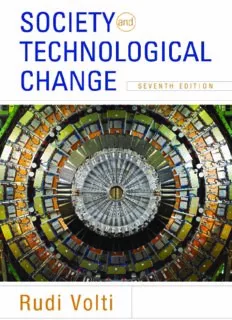Table Of Contentsociety
and
technological
change
Volti7e_01_FM_i-xviii_highres.indd 1 28/11/12 5:52 PM
this page left intentionally blank
Worth Publishers
A Macmillan Higher Education Company
Volti7e_01_FM_i-xviii_highres.indd 2 28/11/12 5:52 PM
society
and
technological
change
seventh edit i o n
Rudi Volti
Pitzer College
Worth Publishers
A Macmillan Higher Education Company
Volti7e_01_FM_i-xviii_highres.indd 3 28/11/12 5:52 PM
Senior Vice President, Editorial and Production: Catherine Woods
Acquisitions Editor: Sarah Berger
Developmental Editor: Kirk Bomont
Executive Marketing Manager: Katherine Nurre
Marketing Assistant: Julie Tompkins
Director of Print and Digital Development: Tracey Kuehn
Associate Managing Editor: Lisa Kinne
Photo Research Manager: Ted Szczepanski
Photo Editor: Cecilia Varas
Art Director: Babs Reingold
Cover and Text Designer: Kevin Kall
Production Manager: Barbara Seixas
Composition: MPS Ltd.
Printing and Binding: RR Donnelley
Cover Art: ©James Brittain/View/Corbis
Library of Congress Control Number: 2012951470
ISBN-13: 978-1-4292-7897-3
ISBN-10: 1-4292-7897-8
©2014, 2009, 2001, 1995 by Worth Publishers
All rights reserved.
Printed in the United States of America
First printing
Worth Publishers
41 Madison Avenue
New York, NY 10010
www.worthpublishers.com
Volti7e_01_FM_i-xviii_highres.indd 4 28/11/12 5:52 PM
Contents
About the Author xiii
Preface xv
part one Orientations 1
Chapter The Nature of Technology 3
1
Defining Technology 3
Technological Advance and the Image of Progress 7
Technology as a Metaphor 10
Technology and Rationality 12
Technological Determinism 15
Living in a Technological Society 17
Questions for Discussion 18
Notes 18
Chapter W inners and Losers: The Differential Effects
2
of Technological Change 21
Technology as a Subversive Force 21
The Luddities 26
Neo-Luddism 28
Whose Technology? 29
What Technology Can Do—And What
It Cannot Do 29
v
Volti7e_01_FM_i-xviii_highres.indd 5 28/11/12 5:52 PM
vi Contents
The Technological Fix 30
Why Technology Can’t Always Fix It 31
The Appeal of Technocracy 33
The Technocrat’s Delusion 36
Questions for Discussion 37
Notes 37
part two The Process of Technological Change 39
Chapter The Sources of Technological Change 41
3
Technological Change as a Social Process 41
The Great Breakthrough 42
The “D” in R&D 44
All Together Now 45
Push and Pull 48
Belated Demand 51
Market Economies and Technological Advance 52
Noneconomic Sources of Technological Advance 54
Questions for Discussion 57
Notes 58
Chapter Scientific Knowledge and Technological Advance 61
4
The Historical Separation of Science and Technology 61
Studies of Contemporary Science–Technology
Relationships 62
How Technology Differs from Science 64
How Technology Stimulates Scientific Discovery 66
Indirect Effects of Technology on Scientific Advance 69
The Commonalities of Science and Technology 71
The Translation of Science into Technology 74
Questions for Discussion 76
Notes 76
Chapter The Diffusion of Technology 79
5
The International Diffusion of Technology 79
Clever Copyists 84
Adaptation and Adoption 85
Learning to Make Steel in Old Japan 86
Volti7e_01_FM_i-xviii_highres.indd 6 28/11/12 5:52 PM
Contents vii
Appropriate Technology 87
Business Firms and Technological Diffusion 90
A Risky Business 91
The NIH Syndrome 92
Efforts to Restrict the Diffusion of Technology 93
Patents and the Diffusion of Technology 94
Questions for Discussion 96
Notes 96
part three How Technology Affects the Health
of the Earth and Its Inhabitants 101
Chapter Technology, Energy, and the Environment 103
6
Fossil Fuels, Air Pollution, and Climate Change 103
A Planet under Stress 107
Is Technology the Problem or the Solution? 108
Some Technological Fixes of the Past 109
Alternatives to Fossil Fuels 110
Doing More with Less 114
More Miles to the Gallon 116
Economic Systems, Government Policies,
and the Environment 118
Questions for Discussion 121
Notes 122
Chapter Medical Technologies 125
7
New Medical Technologies: Choices
and Trade-offs 127
The Case of Kidney Dialysis 127
Replacing Broken Hearts 131
Diagnostic Technologies 135
Medical Technologies and Medical
Ethics 137
New Ways of Making and Sustaining Babies 138
When Does Life End? When Should It? 140
Halfway Technologies 140
Questions for Discussion 141
Notes 141
Volti7e_01_FM_i-xviii_highres.indd 7 28/11/12 5:52 PM
viii Contents
Chapter Genetic Technologies 145
8
The Genetic Fix 145
Discovering Genes and Patenting Them 146
Bioengineering on the Farm 148
Genetic Mapping and Screening 151
Cloning, Present and Future 152
Stem Cells and Future Therapies 155
The Ethics of Genetic Intervention 156
Questions for Discussion 159
Notes 159
part four Technology and the Transformation
of Work 163
Chapter Work in Nonindustrial Societies 165
9
Working with the Earliest Tools 165
Work and Leisure in Technologically Primitive Societies 166
Work and the Development of Agriculture 168
Farming Techniques and Patterns of Work 169
The Ironies of Progress 171
Artisan and Craft Work 171
Guild Organization and Technological Change 174
Slavery and the Inhibition of Technological Development 175
The Measurement of Time and Changed Working
Patterns 176
The Clock 178
Questions for Discussion 180
Notes 180
Chapter Technology and Jobs: More of One and Less of the Other? 183
10
The Technological Threat in Historical Perspective 183
A Case for Optimism 184
How Technology Creates Jobs 186
The Indirect Effects of New Technologies
on Employment 188
Volti7e_01_FM_i-xviii_highres.indd 8 28/11/12 5:52 PM
Description:6 A more extreme (although perhaps apocryphal) example comes from the Polish city of Danzig, where in 1661 the municipal authorities destroyed a mechanical ribbon loom and drowned its inventor, for fear that the new device would put hand weavers out of work.7 Consignment to a watery oblivion

